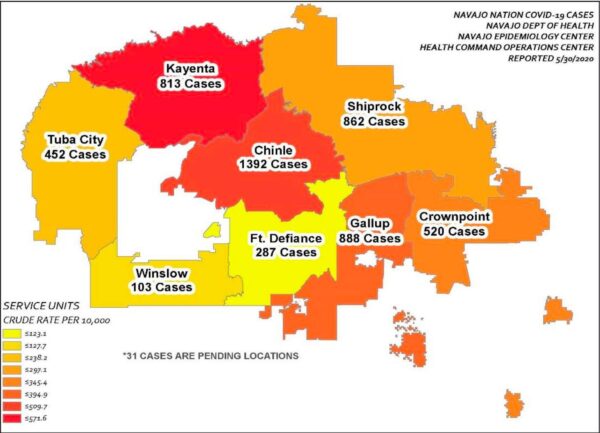
- Details
- By Native News Online Staff
WINDOW ROCK, Ariz. – The Navajo Department of Health, in coordination with the Navajo Epidemiology Center and the Navajo Area Indian Health Service, reported 98 new cases of COVID-19 for the Navajo Nation and five more deaths. The total number of deaths has reached 246 as of Sunday. Preliminary reports from nine health care facilities indicate that approximately 1,840 individuals have recovered from COVID-19, with more reports still pending. The total number of positive COVID-19 cases for the Navajo Nation has reached 5,348.
Navajo Nation cases by Service Unit:
- Chinle Service Unit: 1,392
- Crownpoint Service Unit: 520
- Ft. Defiance Service Unit: 287
- Gallup Service Unit: 888
- Kayenta Service Unit: 813
- Shiprock Service Unit: 862
- Tuba City Service Unit: 452
- Winslow Service Unit: 103
*31 residences are not specific enough to place them accurately in a Service Unit
“As we approach the end of May, let’s remain diligent and stay home and stay safe to minimize the spread of the coronavirus in our Nation. Tomorrow is also the first day of June, and many Navajo elders will be shopping for essential items, such as groceries, household items, and livestock supplies. Please take care of yourself and our precious elders. Adults 65 and older and individuals who have severe chronic medical conditions, such as heart or lung disease, and diabetes, are at higher risk for more serious COVID-19 illness,” Navajo Nation President Jonathan Nez said on Sunday evening.
The Nez-Lizer team, with coordination from the Navajo Nation Division of Economic Development, announced that all Bashas’ Diné Markets on the Navajo Nation would offer special shopping hours from 6:00 a.m. to 10:00 a.m. on June 1, specifically for elders to purchase essential items to help reduce the exposure of COVID-19.
Additionally, the Navajo Nation Division of Social Services and Navajo Health Command Operations Center will be at each location and distribute information on COVID-19 prevention, and homemade masks for elders. There will also be law enforcement presence to help regulate the flow of traffic.
For more information, including reports, helpful prevention tips, and more resources, please visit the Navajo Department of Health’s COVID-19 website at http://www.ndoh.navajo-nsn.gov/COVID-19. To contact the primary Navajo Health Command Operations Center, please call (928) 871-6855.
To Donate to the Navajo Nation
The official webpage for donations to the Navajo Nation, which has further details on how to support the Nation’s Dikos Ntsaaígíí-19 (COVID-19) efforts is: http://www.nndoh.org/donate.html.
For More Information
For more information including reports, helpful prevention tips, and more resources, please visit the Navajo Department of Health’s COVID-19 website at http://www.ndoh.navajo-nsn.
For up to date information on impact the coronavirus pandemic is having in the United States and around the world go to: https://www.worldometers.info/coronavirus/country/us/?fbclid=IwAR1vxfcHfMBnmTFm6hBICQcdbV5aRnMimeP3hVYHdlxJtFWdKF80VV8iHgE
For up-to-date information about COVID-19, Native News Online encourages you to go to Indian Health Service’s COVID-19 webpage and review CDC’s COVID-19 webpage.
More Stories Like This
Native News Weekly (August 25, 2024): D.C. BriefsUS Presidents in Their Own Words Concerning American Indians
Native News Weekly (December 14, 2025): D.C. Briefs
Wounded Knee Massacre Site Protection Bill Passes Congress
Two Murdered on Colville Indian Reservation
Help us defend tribal sovereignty.
At Native News Online, our mission is rooted in telling the stories that strengthen sovereignty and uplift Indigenous voices — not just at year’s end, but every single day.
Because of your generosity last year, we were able to keep our reporters on the ground in tribal communities, at national gatherings and in the halls of Congress — covering the issues that matter most to Indian Country: sovereignty, culture, education, health and economic opportunity.
That support sustained us through a tough year in 2025. Now, as we look to the year ahead, we need your help right now to ensure warrior journalism remains strong — reporting that defends tribal sovereignty, amplifies Native truth, and holds power accountable.
 The stakes couldn't be higher. Your support keeps Native voices heard, Native stories told and Native sovereignty defended.
The stakes couldn't be higher. Your support keeps Native voices heard, Native stories told and Native sovereignty defended.
Stand with Warrior Journalism today.
Levi Rickert (Potawatomi), Editor & Publisher

